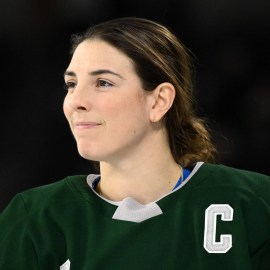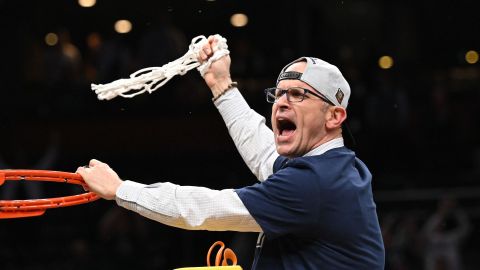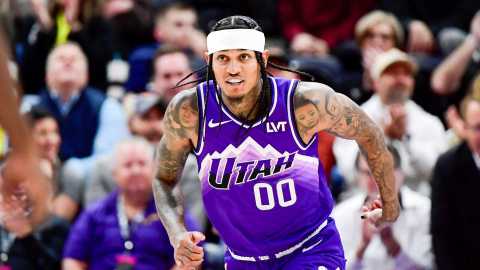Throughout the month of February, NESN and Berkshire Bank are proud to celebrate Black History Month — honoring the many accomplishments and achievements of Black Americans in New England sports. To see all the great stories celebrated on NESN and NESN.com, visit NESN.com/BlackHistoryMonth.
Charlie Titus was a decorated head coach and a pillar of UMass Boston athletics, and his heart still remains with the university and the New England community.
Titus grew up in the former Columbia Point housing project — now Harbor Point — in a single-family household. It was from an early age that he understood the impact of mentor figures in a young person’s life.
“When I was growing up, I had men in my life,” Titus told NESN.com. “I grew up in a single-parent household, never knew my father. But I had men in my life, who took time and cared, who guided, who mentored me. Men like the Rev. Michael E. Haynes, who was a prominent citizen in Boston. Dr. Jeep Jones, who actually ended up becoming the first Black deputy mayor of Boston. Bill Johnson, who was my high school basketball coach. It was natural. I had role models and a roadmap on how to sort of mentor and counsel and care.”
Story continues below advertisement
That roadmap led him to attend Saint Michael’s College in Vermont on a basketball scholarship. The all-male campus was majority white, but Titus admitted race wasn’t much of an issue. While there, he leaned on his professors, and his profound experiences eventually led him to UMass Boston, where he began to serve as the men’s basketball head coach in 1974.
“There were not a lot of black head coaches at the college level,” Titus said. “Obviously, all my friends and family were elated, (but) there were a few people who thought I was crazy.”
The first few years, Titus said he worked without even being paid.
“I had a limited budget,” he said. “They were starting a program. And I thought it was more important that I get the experience. I didn’t plan to be there for long. So I thought it was really important that I got the experience of coaching at the college level, particularly as a head coach at such a young age.
Story continues below advertisement
“I also thought it was important that we used those resources for the student-athletes, as opposed to for me, so we could build a program. We needed to have uniforms and buses to travel, equipment and that kind of stuff. So some of my friends (asked), ‘What are you doing working for free?’ But it all worked out.”
For Titus, it came down to his faith in what the Boston campus could become.
“I actually believed that UMass Boston would grow to have a really good athletic program at some point,” Titus said. “I didn’t know when that would happen. I had no idea that I would be a part of all of that growth. I was just trying to get my foot in the door of coaching.”
No Matchup Found
Click here to enter a different Sportradar ID.
Story continues below advertisement
UMass Boston’s athletic program quite literally was in its infancy. However, the vice chancellor at the time, Levester Tubbs, wanted to build an athletic program. Basketball was the sport he primarily knew, and Titus was entrusted to get the university going.
“I realized the position I was in. I also thought that it was a set of circumstances that allowed it to happen,” Titus recalled. “You know, sometimes when opportunity knocks, you just have to take advantage because it probably won’t come again. Those circumstances, if that was an already established program, there’s no way in heck I would have gotten the job as the head coach. That just wouldn’t have happened, I don’t think. The fact that the vice chancellor for student affairs was a Black man (was rare). There were a whole set of circumstances, I think, that allowed it to happen for me at that time. I had sent out over 250 letters to various colleges around the country looking for an assistant coaching job. I only got one reply: ‘Thanks. but no thanks.’ “
Early on, UMass Boston’s men’s basketball program was successful enough that legendary Georgetown head coach John Thompson tried to convince Titus to leave the Division III program. Titus called Thompson a “great mentor” and noted he was the university’s athletic director when that call occurred. But Titus was interested in helping out the Boston community and continuing to develop the university rather than seeking out personal gain through a bigger program.
That dedication to his community continued throughout his career, according to Titus’ colleagues.
Story continues below advertisement
“One of the things about Charlie has been caring for the young people with whom he’s working and utilizing the access to opportunities to connections that he has, and facilitating that for young people or even people on his own staff and opening those doors,” UMass Boston professor Jemadari Kamara said. “He’s more than willing to use his contacts to help you move forward in the area that you may have chosen. He’s an excellent mentor to young people in many ways.
“Even far beyond those who may have been on his team or something in the past, he’s continued those relationships. As they go on, they finish. They get their degree from UMass, and they’re working in areas, they continue to come back to Charles to seek his advice, his counsel, and he’s willing to give them access to other people in other sectors he may know. And he’s done so at the individual level of these young people who have participated in the programs over the years, as well as for the institution, because he has utilized the access that he has cultivated over four decades as the athletic director to enhance the development of the institution.”
More Boston
Kamara, who also serves as director of the Center for African Caribbean and Community Development, added Titus was crucial to the $5 million donation New Balance invested into UMass Boston, the largest single donation in the university’s history.
That relationship continues — as does Titus’ unselfish desire to help others in the community. Kamara admitted it was an extremely rare trait for someone in Titus’ position to use their platform and resources for others. Titus called it “rewarding” to see his former student-athletes go on and become key members of the community, understanding he played a part in them becoming the people they are today.
Story continues below advertisement
Titus and Kamara work together on the Youth, Education, and Sports with Africa program, where they use sports as a vehicle to help young people in the area develop leadership skills. It’s a testament to the work Titus has done, not only at UMass Boston, that might go “underappreciated” sometimes, according to Kamara.
“One of the things that happens in many places is, people’s work is recognized, is enshrined in institutions in many different ways,” Kamara said. “Some come from individual relationships that are built and expanded. Sometimes it might be a scholarship set up in someone’s name. Sometimes after 40 years of service, and establishing a facility, such as the gymnasium and so forth, an athletic facility that is unnamed, perhaps naming that and the person who built it, almost literally, and whose work is embodied in it, might be an excellent way to recognize that work. But when there’s a leadership that focuses on privatization as its modus operandi, which, unfortunately, is the direction in which UMass Boston has now moved, sometimes there’s limitations on vision.”
Titus helped establish the Little East Conference and earned enshrinements and honors for his 40 years of work at UMass Boston. And he continues to cultivate relationships and create opportunities for those in the community that are most deserving.
“Today, yesterday and tomorrow, it’s all about opportunity,” Titus said. “Being the first Black person to do something, all that says is, I got an opportunity. There were probably many, many people who were capable who could have done it before me and did not have the opportunity. So opportunity is a critical factor in the advancement of people who generally have been left out or underserved. And it doesn’t matter what your skin color is or anything else. If you’ve been underserved, it’s about opportunity. And when you get the opportunity, what do you do with it? I think today, we have over the years created many more opportunities. And you see that reflected in the numbers but not reflected to the extent that it should be. … That’s where inclusion comes in. … And that means you have to break down those cultural barriers and all those stereotypes and that stuff that people have in their heads.
Story continues below advertisement
“It seems to me that diversity and inclusion is experiencing a bit of an attack right now, more than a bit of an attack in this country. It’s something where we have to stay the course, people who are committed to it, and understand the more inclusive we are, the better the country is going to be because a rising tide will raise all the ships, not just one. And until we can get the majority of this country to really understand we’re all in this together and we have to treat each other like that, the country will never reach its true greatness.”
Featured image via UMass Boston


















